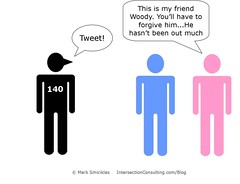A recent NACE survey of 2010 graduates indicated that while over 90 percent of respondents have profiles on social networking sites, a much smaller percentage actually use those sites in their job search.
Less than 30 percent feel that employers should view their profiles, which is understandable — most people use sites like Facebook for social reasons, and aren’t interested in blurring together their personal and professional lives. However, one piece of the survey was surprising, and I found it particularly alarming:
Students using social networking as a job-search resource preferred Facebook (61.5. percent) over MySpace (33.9 percent), LinkedIn (0.9 percent), and Twitter (3.6 percent).
Given their 1-2 ranking among social networks (by user), it’s not that surprising to see Facebook and MySpace as most preferable for job-search resources. But to the tune of 95 percent? Neither network is specifically geared toward professional networking and, in many cases, they skew the opposite direction. My guess is that most people using Facebook and MySpace for their job search are simply going to company pages to see if positions have been posted there. It’s better than nothing, but it’s not really leveraging the social aspect, is it?
The time you spend looking for a job shouldn’t consist solely of filling out online job applications — you should be continually trying to improve yourself and your knowledge of your chosen field, so that every new application is better than the last. Twitter, in all its Bieber-ized glory, can actually be very useful when it comes to acquiring that knowledge. Sure, you could spend time reading all the inane posts about people’s dinner plans, or the latest celeb gossip. But if you want to help yourself find a job, look for leaders in your field and start taking some notes. Interested in PR? Follow @BethHarte and @LizzHarmon. @kevinmd is a primary care doctor, and great follow for pre-med students with a desire to learn more about some hot-button medical topics. Use a service like WeFollow to look up key individuals that are interested in the same things you are, and you’ll be sure to learn something that will help you write a better cover letter, or perform better in an interview. Also be sure to check out who WE are following @BucknellCareer.
LinkedIn, the least-preferred of the four social networks listed in the survey, is an even more surprising omission from the job search. The site is built for professional networking. For a job seeker looking to go beyond filling out applications, it offers easy ways to join related professional groups, ask questions of leaders in your field, and to search for 1st, 2nd, or 3rd degree connections at companies that you’re interested in. You’ll have much better results if you apply for jobs in places where you’ve already built a relationship, and LinkedIn will help you identify those people to connect with. If you’re not sure how to start the conversation once you’ve identified someone, be sure to check out what we have to say about the strategy of informational interviewing. And here’s some general tips on how to get started on LinkedIn.
Whether you like it or not, employers are increasingly using social networking tools to identify the best candidates for their jobs. It’s fine to continue using sites like Facebook and MySpace for purely personal reasons. But in order to truly take advantage of what social networking has to offer in the job search, it’s important to lean on the social aspects of those sites to connect with people, rather than using them as simply a replacement or supplement to job boards.
What’s your take on the NACE survey, and how have you used social networking in your job search?

[…] This post was mentioned on Twitter by Bucknell Career . Bucknell Career said: New Blog Post: In your job search, don’t take the ‘social’ out of ‘social networking’ http://ht.ly/17XBiv […]